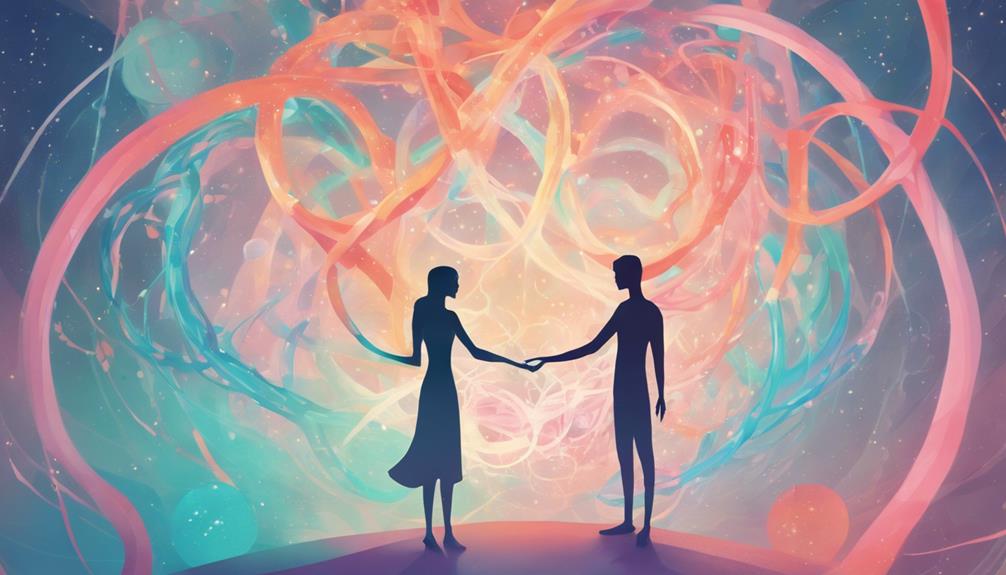Summary
- 1 Key Points
- 2 The Myth of the Twin Souls
- 3 Love at first sight
- 4 And they lived happily ever after
- 5 Love conquers all
- 6 The role of chemistry
- 7 Commitment and engagement
- 8 Frequently Asked Questions
- 8.1 How does modern technology affect romantic relationships?
- 8.2 What are the cultural differences in expressions of romantic love?
- 8.3 How do financial issues affect romantic relationships?
- 8.4 What are the signs of a healthy romantic relationship?
- 8.5 How can couples maintain individuality within a relationship?
You've probably heard of myths such as 'soul mates' e 'love at first sight', but these ideas do not tell the whole story. Relationships thrive through commitment, trust and shared experiences, not just instant attraction. True love grows over time, beyond the physical chemistry. True partnerships require good communication, realistic expectations and mutual compromises. The media often show love as something easy, but true happiness requires facing challenges together. While chemistry triggers a connection, commitment and patience keep relationships strong. If you are curious to deepen your understanding of love, there is still much to discover.
Key Points
- Soul mates are a myth; successful relationships are based on commitment and mutual decisions.
- True love evolves over time, unlike instant attraction which is based on physical chemistry.
- Real relationships require growth, commitment and realistic expectations, not effortless perfection.
- Communication, conflict resolution, and mutual compromise are fundamental to a healthy partnership.
- Love alone cannot solve problems; practical actions and emotional support are essential.
The Myth of the Twin Souls

Over time, the idea that there is an ideal person out there just for you has gained popularity, but it is more myth than reality. The concept of a soul mate implies that your love life is influenced by fate, leaving little room for personal decisions. However, in reality, relationships thrive based on the decisions you make and the effort you invest.
Think about it: if there was only one 'perfect mate' for everyone, discovering that person would be like looking for a needle in a haystack. Instead, love often blossoms from shared experiences and mutual respect, not from some predetermined fate. You might meet someone who seems to be an ideal match, but probably because you both choose to overcome challenges and appreciate each other's strengths.
Reflect on your friendships. You don't rely on fate to find a best friend; you cultivate that bond through shared interests and trust. Romantic love works in a similar way. By actively choosing to cultivate your relationship, you establish a stronger bond. Therefore, while the concept of a soul mate is romantic, true love is about the decisions you make together.
Love at first sight
You might believe in love at first sight, but it is usually more about instant attraction than true love. Think about the emotion you feel when you see someone incredibly attractive: it is a powerful emotion, but it is not the same as knowing and loving someone deeply. True love grows over time, mixing emotional connection with understanding and shared experiences.
Instant Emotional Connection
At some point, you've probably wondered whether love at first sight is genuine or just a romantic myth. The idea of meeting someone and feeling instantly connected is appealing. But what really happens when you feel that spark?
First of all, let's talk about physical chemistry. When you see someone who catches your eye, your body may react with a wave of adrenaline. This can make your heart pound and your palms sweat. It is your body's way of saying, "Pay attention!" This physical reaction is powerful, but it is not the whole story.
Next, there is emotional bonding. While physical chemistry can create instant attraction, genuine emotional bonding takes time. You may feel an instant connection because of shared interests or similar life experiences. For example, you both love the same books or have had similar life challenges. These similarities can make you feel understood and connected quickly.
However, it is important to keep in mind that an instant emotional connection does not mean having found lasting love. True love grows through shared experiences, trust and understanding. So while love at first sight may begin with physical chemistry, real emotional connection takes time to develop.
Attraction Vs. Love
Many people often confuse the intense allure of attraction with the deeper and more lasting experience of love. Attraction is usually based on physical attractiveness. You may see someone and feel an immediate attraction to them, often described as 'love at first sight.' However, what you are experiencing is probably infatuation, and not a true emotional connection. Infatuation is powerful but superficial; it is driven by looks, charm or charisma.
On the other hand, love grows over time. It is not just physical attraction; it is also an emotional bond that develops as you get to know someone. Love involves understanding, trust and mutual respect. It is the difference between admiring someone's looks and admiring their character and values.
Ad esempio, potresti sentire le butterflies nello stomaco quando incontri qualcuno attraente, ma quei sentimenti possono svanire rapidamente se non c'è una connessione più profonda. L'amore vero, invece, è come una pianta che ha bisogno di cure. Richiede tempo, sforzo e cura reciproca per crescere.
And they lived happily ever after

When you think of 'they lived happily ever after,' it is easy to imagine a fairy tale ending where everything is perfect. But real life is not a storybook, and expecting perfection can lead to disappointment. Instead, recognize that relationships need growth and commitment, and true happiness comes from working together through challenges.
Unrealistic expectations belied
Despite what fairy tales might suggest, the idea of 'happily ever after' often creates unrealistic expectations for real-life relationships. Media influence and social pressures can make you believe that love should be effortless and perfect. Movies and TV programs often portray relationships as grandiose, sweeping romances where every problem is quickly solved and everyone lives happily ever after. This creates a fantasy that can clash with reality.
In reality, relationships require commitment, compromise, and sometimes even professional help. Expecting everything to be perfect all the time can lead to disappointment and frustration. It is crucial to understand the difference between fantasy and reality. True expectations involve recognizing that arguments happen, feelings can be hurt, and both partners must work to understand and support each other.
Think about it: just like in any other aspect of life, relationships have ups and downs. You wouldn't expect your job to be perfect every day, would you? The same goes for love. It is important to set realistic expectations so that you can appreciate the true imperfect beauty of your relationship. Remember, 'happily ever after' is not a destination but a journey of growth and evolution together.
Tips for relationship growth
True growth in a relationship happens when both partners are committed to learning and evolving together. It means you are both willing to invest in personal development and improve your communication skills. Imagine your relationship as a garden: without constant care and attention, it cannot flourish.
Personal development plays a key role in this growth. When you work to become the best version of yourself, you bring positive energy into the relationship. For example, if you are passionate about learning new things or setting personal goals, you inspire your partner to do the same. This mutual growth creates a stronger bond.
Communication skills are equally essential. Open and honest conversations help you understand each other better and resolve conflicts more efficiently. Imagine you had a misunderstanding. Instead of letting it ferment, you calmly talk about it, actively listen, and find a solution together. This habit of clear communication promotes trust and intimacy.
Ultimately, relationship growth is not about grand gestures. It is the daily efforts that make the difference: sharing your dreams, supporting each other's goals, and talking openly. By focusing on personal development and honing your communication skills, you create a lasting and happy partnership.
Realistic partnership dynamics
In a realistic partnership, happily ever after means embracing both good times and challenges together. It is not about perfection, but about learning and growing together. Solid communication skills are essential. You need to talk openly about your feelings and listen to your partner. This makes you feel understood and appreciated.
Conflict resolution is another important key. Disagreements are normal, but how you deal with them can make a difference in a relationship. Instead of fighting, try to find a solution that works for both of you. This shows respect and strengthens the bond.
Here is a quick guide to the essentials of a realistic partnership:
| Appearance | Description |
|---|---|
| Communication skills | Openly share thoughts and listen to each other. |
| Conflict resolution | Find solutions together and avoid unnecessary quarrels. |
| Shared goals | Work together to achieve common goals to make sure we are on the same page. |
Imagine that you both want different things for your future. Without good communication skills, these differences can lead to conflict. But if you talk and compromise, you are more likely to stay happy together. Remember, happily ever after is not a fairy tale; it's about facing life as a team.
Love conquers all
We often hear the phrase "love conquers all", suggesting that love alone can overcome any obstacle. But is this really true? Although love is powerful, it is not a magic solution to every problem. Relationships face many challenges, such as the financial stress, i health problems or the remote situations. Overcoming obstacles in a relationship requires more than just love; it requires patience, communication And mutual effort.
Consider a couple facing financial difficulties. Love gives them the motivation to face challenges together, but they must also create a budget, find new sources of income, and support themselves emotionally. Without such practical steps, their love may struggle to survive the stress.
Another example is a couple facing a serious illness. Love provides the emotional support needed to overcome difficult times, but they also need medical help, understanding, and resilience. Their love helps them stay strong, but it is the combination of love and concrete actions that makes the difference.
The role of chemistry

While practical efforts are essential, the chemistry between two people often acts as the spark that keeps a relationship alive. You've probably felt an instant connection with someone without really knowing why. That's the chemistry at work. It is that magnetic pull, that physical attraction that you cannot explain. This chemistry is not just emotional; it's science-based.
When you meet someone you are attracted to, your body reacts in fascinating ways. Hormonal responses come into play, releasing chemicals such as dopamine and oxytocin. Dopamine gives you a pleasant feeling of pleasure, making you feel happy and excited. Oxytocin, often called the 'love hormone,' helps you bond and feel close to your partner.
Think of the butterflies in your stomach when you see someone special. It's your body's way of saying, 'Hey, pay attention!' It is these physical attractions and hormonal responses that make the early days of a relationship so exciting.
However, although chemistry is important, it is not the only factor. It sets the stage, but maintaining a relationship requires more. Understanding the role of chemistry helps you appreciate why some connections seem electrifying from the start.
Commitment and engagement
A lasting relationship thrives not only on chemistry but also on the continued commitment and unwavering effort of both partners. It is easy to get caught up in the initial excitement, but maintaining a relationship requires constant effort. Think of it like a garden; if you don't water the plants regularly, they will wither. Likewise, your relationship needs regular attention and care.
Genuine commitment means being there for each other, even when things get tough. It's about making sacrifices and putting your partner's needs alongside your own. For example, you may have had a long day at work, but you still make time to listen to your partner's concerns. This shows that you value them and are willing to invest in the relationship.
Constant effort includes small daily actions such as sending a thoughtful message or planning a surprise. These small gestures build a solid foundation over time. These are not just big romantic gestures but the everyday things that show you care. By combining consistent effort with genuine commitment, you create a relationship that is resilient and fulfilling for both of you.
Frequently Asked Questions
How does modern technology affect romantic relationships?
Modern technology helps maintain long-distance relationships, but it can also cause problems if social media boundaries are not respected. For example, the constant online presence could blur privacy boundaries, leading to misunderstandings and potential conflicts.
What are the cultural differences in expressions of romantic love?
You will find the cultural differences in terms of romantic love fascinating. Cross-cultural comparisons reveal unique romantic gestures, varied love languages, and distinct relational customs. For example, public affection is common in some cultures, rare in others.
How do financial issues affect romantic relationships?
Money-related conflicts can cause tension in relationships, leading to arguments and stress. If you and your partner are not on the same page financially, it is easy for tension to build up. Open communication about money can help.
What are the signs of a healthy romantic relationship?
In a healthy romantic relationship, you will notice strong communication skills and high emotional intelligence. Examples include openly discussing feelings, calmly resolving conflicts, and showing empathy. These traits help build trust and deepen the bond.
How can couples maintain individuality within a relationship?
To maintain individuality within a relationship, establish personal boundaries and promote mutual respect. For example, devote time to your hobbies and interests separately from time to time. This will allow you both to remain fulfilled and will strengthen your bond.
